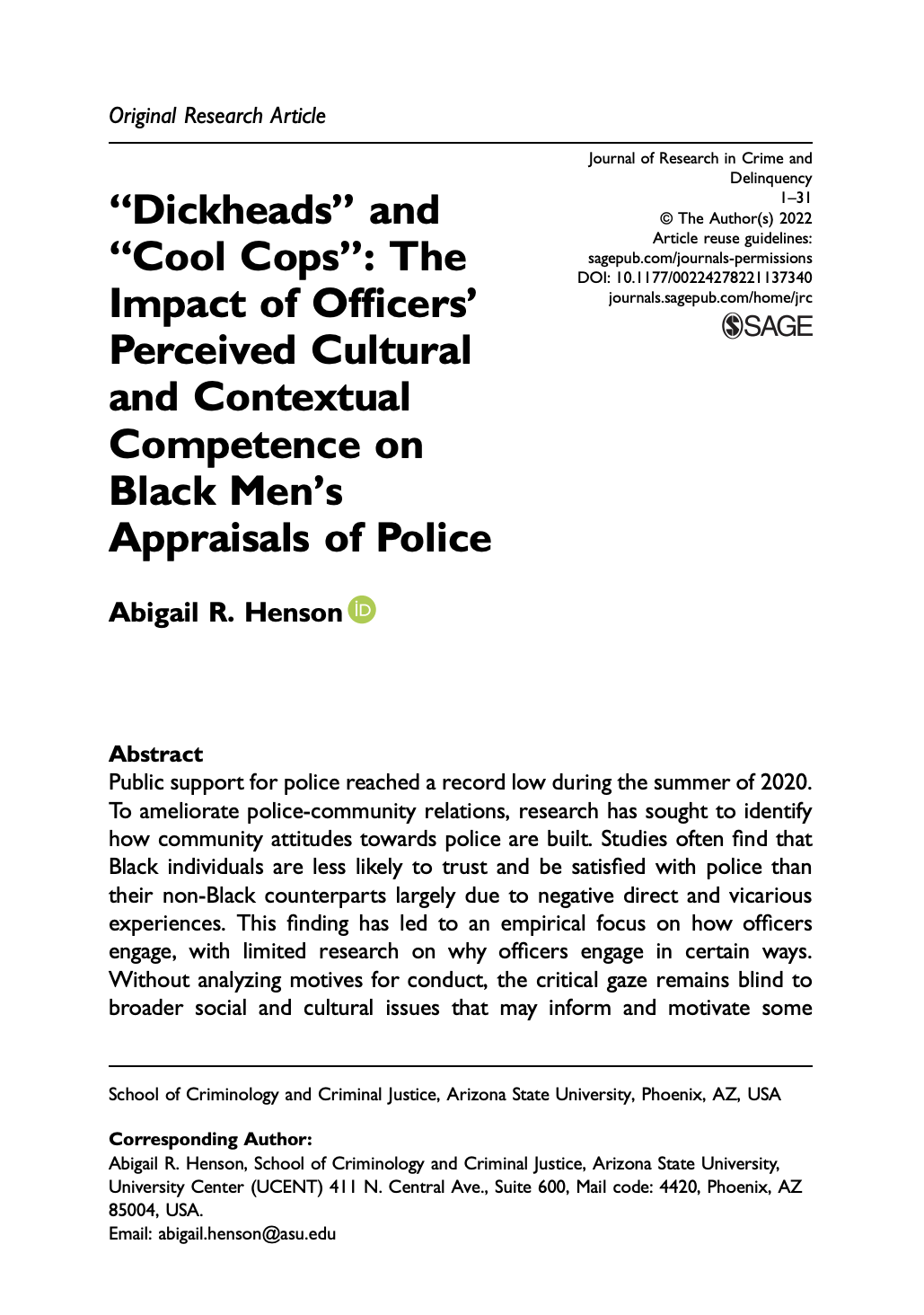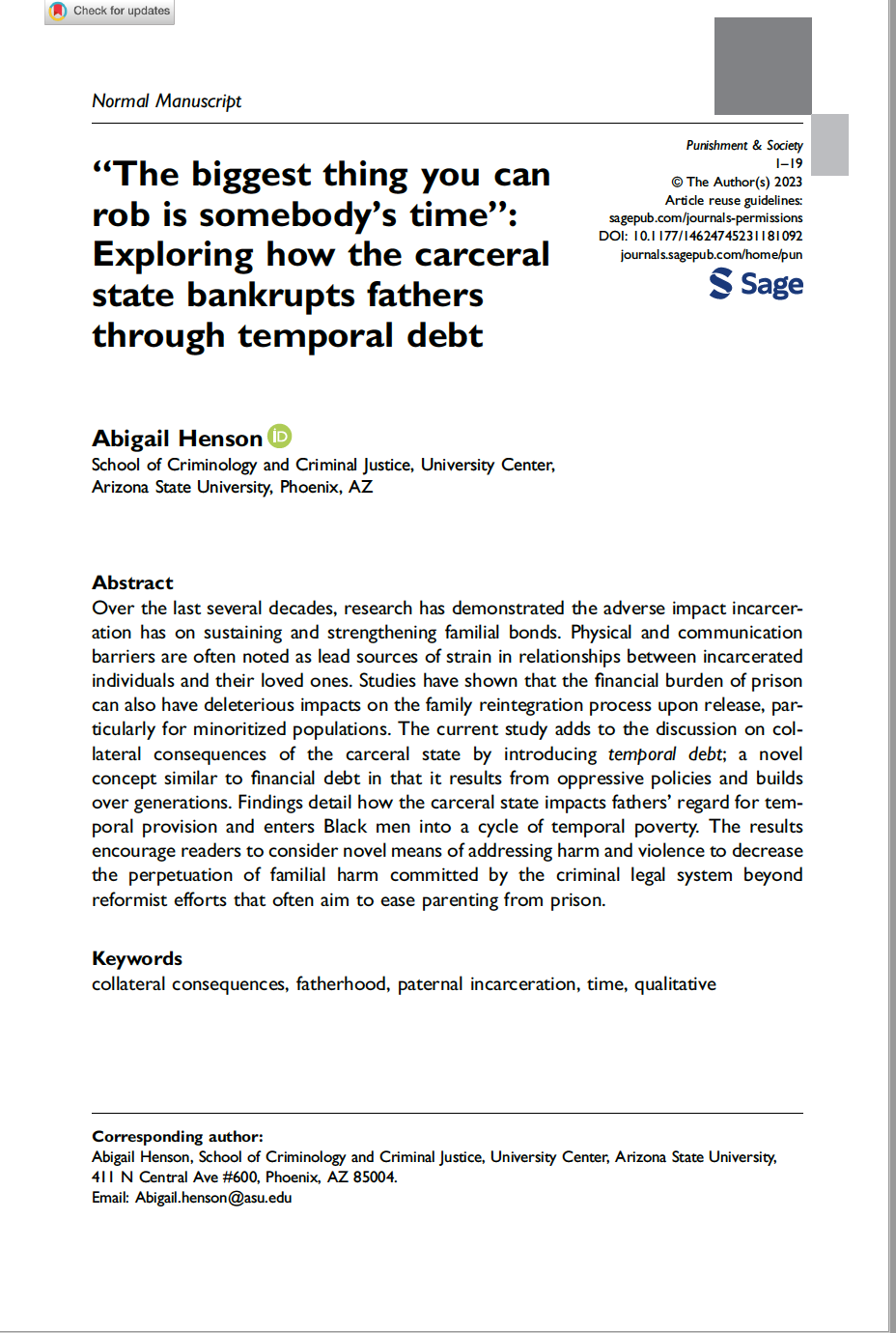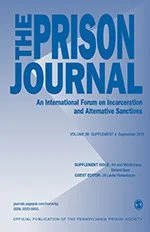Punishment & Society, 2023
“The biggest thing you can rob is somebody’s time”: Exploring how the carceral state bankrupts fathers through temporal debt
Over the last several decades, research has demonstrated the adverse impact incarceration has on sustaining and strengthening familial bonds. Physical and communication barriers are often noted as lead sources of strain in relationships between incarcerated individuals and their loved ones. Studies have shown that the financial burden of prison can also have deleterious impacts on the family reintegration process upon release, particularly for minoritized populations. The current study adds to the discussion on collateral consequences of the carceral state by introducing temporal debt; a novel concept similar to financial debt in that it results from oppressive policies and builds over generations. Findings detail how the carceral state impacts fathers’ regard for temporal provision and enters Black men into a cycle of temporal poverty. The results encourage readers to consider novel means of addressing harm and violence to decrease the perpetuation of familial harm committed by the criminal legal system beyond reformist efforts that often aim to ease parenting from prison.
Qualitative Social Work, 2023
Tadros, E., Henson, A., & Presley, S. (2023). Hear their voices: What loved ones of incarcerated individuals need. Qualitative Social Work, 0(0), 1-18.
The United States incarcerates more people than any other country in the world. As a result, a growing body of critical research has sought to understand the impact of the carceral experience, not only on those currently or previously incarcerated but also on those connected to incarcerated individuals. Much of this research identifies the barriers and difficulties loved ones of incarcerated individuals (LOIs) encounter; however, few of these studies highlight the ways LOIs navigate and overcome such barriers. By using this deficits-framework, LOIs can be mischaracterized as solely powerless or disordered. Also, while many studies importantly identify difficulties in navigating the carceral experience of a loved one, few allow LOIs to speak directly to their needs. Drawing upon deidentified Facebook posts from an online LOI group, the current study takes a strengths-based approach to showcase how LOIs attempt to address their needs and assuage difficulties by engaging in storytelling, advice and information sharing, and advocacy work.
Critical Criminology, 2022
Henson, A; Nguyen, T, & Olaghere, A. (2022). Centering racism in criminological theory. Critical Criminology.
Many leading criminological theories problematically focus on individuals and communities as criminal rather than implicating structures and systems that perpetuate harm. We offer a nine-step protocol to invert and redefine three predominant deficits-based criminological theories. Our inversion method produced punitive provocation theory, critical environmental adaptation theory, and socio-structural induction theory, as theoretical inversions of deterrence, social disorganization, and self-control theory. We suggest different measurement options for each new inverted theory, including a focus on the structural antecedents of crime such as racial/ethnic discrimination, exclusion, surveillance practices, and divestment from communities. To ameliorate under-theorizing and create a more equitable and less harmful society, we urge theorists, researchers, and practitioners to adopt a more inclusive, critical, and reflexive approach to understanding human behavior.
Critical Social Policy, 2022
Henson, A. & Rosenthal, J. (2022). The importance of investing in community services beyond “the basics”: A needs assessment conducted with young Black fathers in Southwest Philadelphia. Critical Social Policy.
The police killings of unarmed Black men and women, particularly in the year 2020, fueled a moral outcry for defunding the police. The defund movement asserts that divested police funds should be invested in communities most devastated by hyper-policing. However, decisions on which community services to finance are often void of community input. To fill this gap, the current study highlights responses from 50 Black fathers living in southwest Philadelphia on community resources necessary for themselves and their children to live safe and prosperous lives. The men explained that, to enhance public safety and recover from the devastation of social stigmatization and marginalization, funds need to be invested in resources beyond the ‘basics’ (i.e., housing, employment, health care). Specifically, the fathers wanted local educational and entrepreneurial opportunities that would allow community members to demonstrate their full potential.
Crime & Delinquency, 2022a
Henson, A. (2022) “Dickheads” and “Cool cops”: The impact of officers’ perceived cultural competence and contextual familiarity on Black men’s appraisals of police. Journal of Research in Crime and Delinquency.
Public support for police reached a record low during the summer of 2020. To ameliorate police-community relations, research has sought to identify how community attitudes towards police are built. Studies often find that Black individuals are less likely to trust and be satisfied with police than their non-Black counterparts largely due to negative direct and vicarious experiences. This finding has led to an empirical focus on how officers engage, with limited research on why officers engage in certain ways. Without analyzing motives for conduct, the critical gaze remains blind to broader social and cultural issues that may inform and motivate some officers’ harmful and discriminatory actions. The current study highlights how Black men implicate segregation, media-induced miseducation, cultural and contextual incompetence, and hostile police culture for mutual distrust and officers’ misconduct. These findings promote harm reductionist policy to enhance officers’ cultural and contextual competence and encourage researchers and practitioners to consider an abolitionist agenda that a) focuses on the implementation and evaluation of novel and existing trauma-informed, community-based means of addressing harm in order to ultimately dissolve police power, and b) promotes cultural shifts by increasing diverse learning opportunities and critical curriculum in educational spaces.
Crime & Delinquency, 2022b
Fader, J., Henson, A, & Brey, J. (2022). “I Don’t Want to be a Statistic”: Racial-Criminal Stigma and Redemptive Generativity. Crime & Delinquency. (ACJS 2022-23 William L. Simon/Routledge Outstanding Paper Award Winner)
Within the context of racial caste and the “stickiness” of criminal labels, men struggle to craft positive masculine identities. Contesting racial-criminal stigma requires men of color to challenge controlling images of violent Black men. Analyzing narratives of 45 millennial men in Philadelphia, we identify redemption bids and redemptive generativity as ways of defying social stigma. Redemption, which has been highlighted in the desistance literature, is a central concern of the men of color we studied, regardless of prior law-breaking or system involvement. Because a criminal history is presumed regardless of past behavior, many men of color engage in performances of “making good” similar to those who were actively engaged in the work of desistance.
Int. J. Environ. Res. Public Health 2021
Montes, A.N., Wallace, D., Fahmy, C., Henson, A., Chamberlain, A.W., & Jacobs, L.A. (2021) An Assessment of Prisoner Reentry, Legal Financial Obligations and Family Financial Support: A Focus on Fathers. Int. J. Environ. Res. Public Health, 18, 9625.
Scholars have found that family support is an important facilitator of successful reentry from prison to the community. At the same time, they have argued that owing court-ordered fines or fees, also called legal financial obligations (LFOs), can act as an additional barrier to reentry, especially for parents. There remains a need to test how LFOs impact the financial support formerly incarcerated parents receive from their families. The current study responds to this gap by employing logistic regression analyses of the Serious and Violent Offender Reentry Initiative (SVORI) data to test whether owing court fees is associated with formerly incarcerated fathers’ (1) perceptions of available financial support from family and (2) receipt of financial support from family. We find that owing court fees is not associated with perceptions of available financial support. However, owing court fees has a positive, statistically significant association with receiving financial support from family during the first three months after prison release. This relationship remains after accounting for whether the person owes child support or sees their children monthly. Our results suggest that LFOs may create a greater need for financial support among formerly incarcerated fathers, making the financial challenges of reentry a consequence not just for those who were incarcerated but for their loved ones as well.
Journal of Family Social Work, 2020
Fagan, J., Henson, A., & Pearson, J., (2020). Low-income mothers’ participation in the Understanding DadsTM intervention and changes in self-reported coparenting. Journal of Family Social Work, 24(3), 199-218.
This study presents findings of a mother-only coparenting intervention conducted in conjunction with fathers’ participation in a fatherhood program. Specifically, this study sets out to determine whether there is an association between mothers’ participation (N = 127) in the group-based intervention, Understanding Dads™, and changes in mothers’ reports of the coparenting relationship and mothers’ coparenting attitudes. The findings of this one group pretest/posttest/follow-up study showed that mothers reported fewer disagreements and less undermining of fathers following participation in the intervention. Mothers also indicated greater confidence in their ability to coparent cooperatively with the father after participation. Implications for fatherhood programs are discussed.
Punishment & Society, 2022
Henson, A. (2020). Desistance, Persistence, Resilience and Resistance: A qualitative examination of howfathers with criminal records navigate employer discrimination. Punishment & Society, 24(2), 262-283.
While research suggests a growing proclivity amongst contemporary fathers towards emotional involvement and child caregiving, studies indicate that most men still experience unrelenting pressure to provide financially for their family. For some fathers, the ability to spend time with their children is contingent on financial provision. Fathering, therefore, can be dependent on employment. The intersection of Blackness, maleness, and a criminal record, however, often results in employer discrimination, which hinders reentering Black men’s ability to secure legitimate revenue streams and achieve fathering expectations. In response to these barriers, many men agentically create opportunities for themselves in order to provide for their families. Framed using Sites of Resilience and Posttraumatic Growth, the current study draws from qualitative data and adds to the literature by focusing on the act of hurdling rather than the hurdles faced upon reentry. Findings demonstrate how hustling upon reentry is not a display of persistent criminal character but, rather, reflects a resilient response to systemic racism and blocked opportunities. The discussion on policy implications is led by participant suggestions on how to deter criminal activity while providing opportunities for men with criminal records to support their families.
Prison Journal, 2020
Henson, A. (2020). Meet them where they are: The importance of contextual relevance in prison-based parenting programs. The Prison Journal, 100(4), 468-487.
Parenting from prison is dramatically different than parenting in the community. The removal from home and redefinition of self that occurs within the carceral setting often leads incarcerated parents to feel anxious and inadequate in their parental role. While some prison-based parenting programs (PBPPs) can assuage these issues, they often lack contextual relevance, which can make participants frustrated and dissatisfied. Using an example of a prison-based fatherhood program, this article argues that in order for PBPPs to have sustained positive outcomes, they must also address the issues enmeshed in parenting from prison.









